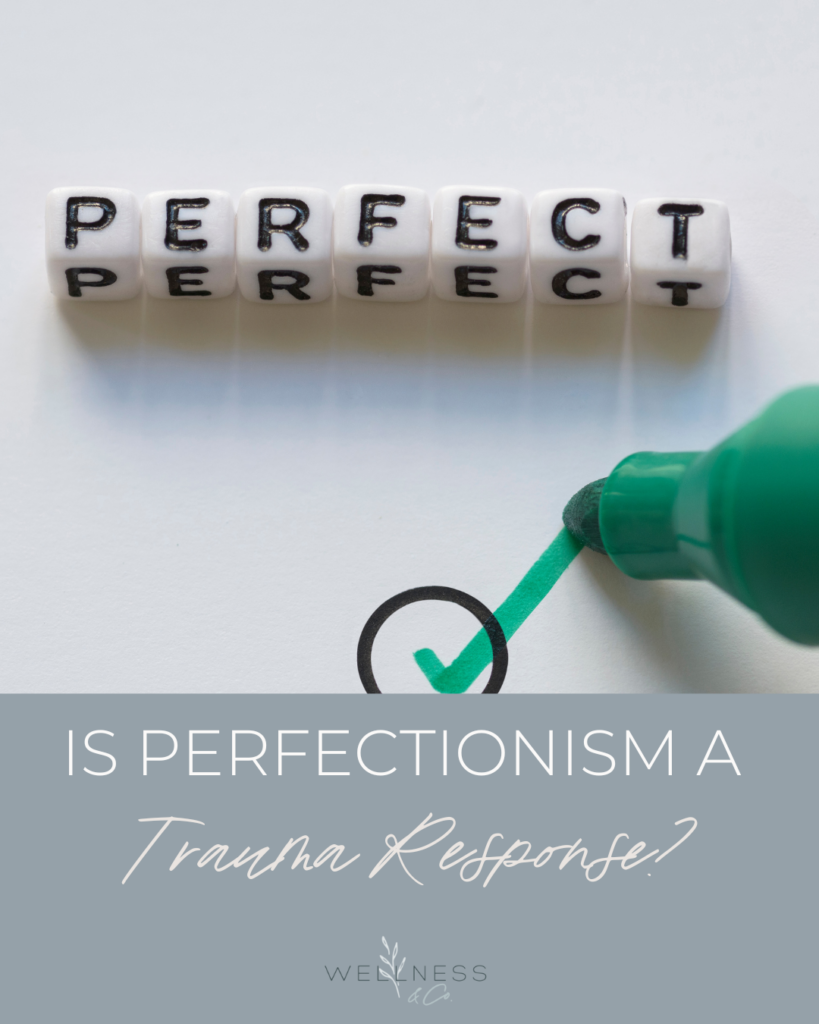Follow
Wellness & Co.
Hi, I'm Dr. K, Wellness & Co. is a growing therapy/coaching practice and educational hub for prospective clients based in Maryland and virtual clients all over the world!
Hi, I'm Dr. K
free guide
e -books
e -course
Is Perfectionism a Trauma Response? (TL;DR It Can Be, and Self-Compassion Helps!)
January 23, 2024
By Ana Rogers, LGPC, NCC
READING TIME: 5 minutes

Hi hi! So glad you stopped by. You are not alone if today’s blog feels personally relevant. It also resonates with me. It took me a hot minute to settle on this topic, all thanks to the analysis paralysis that seizes my brain when I feel tasked to execute something *perfectly*…which is…frequently. These expectations of perfection are often unattainable and entirely self-imposed.
On my personal healing journey (yes, therapists have therapists), I’ve begun to understand something powerful: my deep-rooted perfectionism stems from past traumatic experiences.
And simply existing in this world as a Virgo.
Cue the metaphorical light bulb moment! What better way to enter the blogosphere than to write on a topic near and dear to my recovering perfectionist heart?
Life can often feel overwhelming, exhausting, and even confusing for those of us challenged by perfectionist tendencies. Why are we so critical of and hard on ourselves? Viewing perfectionism through a trauma-informed lens can be illuminating.
What is Perfectionism?
Let’s define ‘perfectionism’: a relentless, exhausting pursuit of flawlessness in which we place unrealistic demands on ourselves (and sometimes others) to meet excessively high goals.
We see three kinds of perfectionism in the research:
- Self-oriented perfectionism: setting incredibly high personal standards and being self-critical when failing to meet them, frequently leading to various mental health challenges (e.g., symptoms of depression and anxiety).
- Socially prescribed perfectionism: believing that others (e.g., parents, partners, friends) have high expectations of us succeeding in specific ways, often followed by self-criticism, self-judgment, and low self-esteem when failing to meet them. Fearing a loss of affection from others if we’re not meeting perceived expectations is also common.
- Other-oriented perfectionism: expecting others (e.g., loved ones) to meet the same standards imposed on ourselves, which can contribute to aggressive communication styles used to criticize or express our disapproval.
I invite you to pause for a moment and reflect: How does perfectionism show up for you in your day to day? Does it impact how you function in your relationships? You might notice that one kind describes your experiences more than the others. Maybe all three types are true for you, depending on the situation’s context. If you’re open to sharing, let me know in the comments!
Perfectionism as a Trauma Response
Okay, let’s get to the meat and potatoes of why we’re here.
Trauma encompasses a wide range of adverse experiences like emotional, physical, and sexual abuse, neglect, the abrupt loss of a loved one… essentially, these are events that leave lasting imprints on our psyches. Trauma disrupts our worldviews and our sense of safety, security, and emotional well-being.
So. Is perfectionism a trauma response? In short, yes, it can be. Not all perfectionists have experienced trauma, and not all trauma leads to perfectionism. However, research shows a highly complex relationship AND strong correlation between trauma (particularly childhood experiences) and perfectionism. If you’re curious about recent studies, take a look at some of these: Chen et al., 2019; Dobos et al., 2021; Molnar et al., 2021.
Perfectionism can be connected to trauma for many reasons. Let’s discuss some of them!
- Safety-seeking and regaining control:
‘If I am perfect, nothing bad will happen to me again.’ Fixating on perfection allows trauma survivors to exert control over their lives and emotions, taking back their sense of safety and autonomy. Our world is incredibly unpredictable. Perfectionism makes life feel a little more safe and predictable. However, this pursuit of control and flawlessness can lead to extreme discomfort in the form of heightened anxiety and hypervigilance.
- Self-worth, validation, and coping with shame:
Perfectionism might develop to regain a sense of worthiness and validation. By striving for perfection in everything we do, we might be attempting to avoid (or outperform) the very real sense of shame or “brokenness” stemming from trauma that has impaired our self-worth and sense of identity. The constant pressure to be perfect to feel ‘enough’ can be exhausting and contribute to feelings of depression.
The biggest takeaway here is that perfectionism often shows up as a coping mechanism. After traumatic experiences, we might internalize a belief that our sense of worth and safety depends on meeting unrealistic expectations. We might end up feeling that we are good because of what we do, not because of who we are.
The Importance of Self-Compassion
One of the most frustrating elements of struggling with perfectionism is that we live in a society that reinforces it and often does not view it from a trauma-informed lens. Our behaviors and goals are seen as desirable and directly connected to productivity and success. This makes learning balance and embracing the idea that ‘good enough is good enough’ extra hard.
This is where the intentional cultivation and daily practice of self-compassion help us heal.
In the lovely words of Dr. Kristin Neff: “Instead of mercilessly judging and criticizing yourself for various inadequacies or shortcomings, self-compassion means you are kind and understanding when confronted with personal failings – after all, who ever said you were supposed to be perfect?”
Self-compassion means…being kind to ourselves. This applies even when we’re not meeting our high standards. Approach yourself from a place of curiosity and compassion, not critique. Give yourself grace.
Self-compassion means…recognizing that others struggle with the same things. This can help reduce feelings of isolation and aloneness. You are not weird or broken.
Self-compassion means…being mindful of and noticing what’s happening in our brain and body when perfectionist tendencies creep in (or, let’s be honest, crash onto the scene). Then, we do our best not to over-identify with these thoughts and feelings. Mindfulness means we can hold space for what we’re experiencing and observe things as they are without taking action due to the urgency we sometimes feel. Simply observe. Easier said than done, I know.
We must embrace that good enough is truly good enough (that we are good enough!) and that ‘perfect’ won’t protect us from uncertainty or really uncomfortable feelings like shame. It really can’t, but you really can handle all those things.
Practicing self-compassion is often a good first step on our healing journeys.
I want to emphasize that this is a practice. If you’re anything like me, you might start beating yourself up for not doing the self-compassion thing well enough (read: perfectly). And then you’ll want to beat yourself up for beating yourself up. Stop. Breathe. Extend yourself grace… again.
Feeling like it might be helpful to connect one-on-one with someone who gets it? Schedule a free consultation with me here! Curious about what else I offer? Feel free to take a look. Check out the other awesome providers on the Wellness & Co. team while you’re at it!
I have a powerful urge to sign off by saying ‘XOXO’ (Gossip Girl, anyone?), but I won’t.
Let’s chat again soon,
Ana

Ana’s passion is providing a therapy space where you feel heard, seen, and valued. Whether you’re a couple looking to rebuild connection, a family seeking support in navigating life’s complexities together, or an individual wanting to heal and grow, she is here to walk alongside you!
Leave a Reply Cancel reply
CONTACT
Start Here
BLOG
OUR TEAM
SHOP
ABOUT
©2025 Wellness & Co. | All Rights Reserved | Design by EverMint Design Studio
BACK TO TOP
connect with us on instagram
